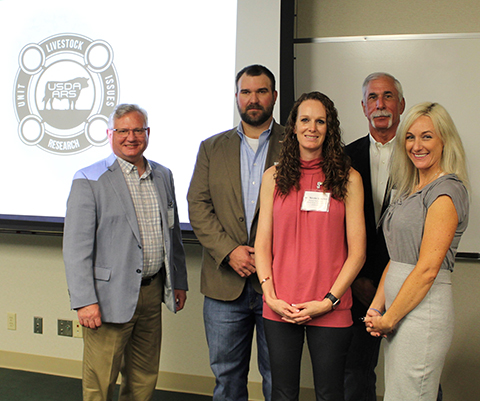USDA Research Facility in Lubbock Commemorates Over 20 Years of Contributions to the Livestock Industry
Contact: Maribel Alonso
Email: Maribel.Alonso@usda.gov
LUBBOCK, TEXAS, August 23, 2022—The USDA's Agricultural Research Service, Livestock Issues Research Unit, held today an open house event to commemorate 23 years of accomplished research and contributions to the beef, dairy, and swine industries.
The event was launched by key Agricultural Research Service leaders, including Plains Area Associate Director Dr. Bryan Kaphammer, Cropping Systems Research Laboratory Director Dr. Alex Rooney, and Livestock Issues Research Unit Research Leader Dr. Jeff Carroll, providing opening remarks.
"For more than 20 years, the Livestock Issues Research Unit has remained dedicated to providing food animal industries with scientific knowledge, biotechnologies, and best animal practices to improve animal health, well-being, and production efficiency," said Carroll during his opening statement.
The Livestock Issues Research Unit, or LIRU, was established in 1999 to investigate the relationship between livestock behavior and preharvest food safety. Particularly how extreme weather conditions and social and environmental elements (e.g., weaning and transportation) can cause stress in cattle and severely impact their development, reproduction, and susceptibility to infection. In which case, production efficiency, food safety, and quality are all affected.
Over the years, LIRU scientists and collaborators have provided stakeholders with alternate tactics and management practices that help mitigate stress, strengthen the animal's immune function, and improve animal health and well-being.
 The USDA ARS Livestock Issues Research Unit staff provided an informative tour during the open house event on Aug. 23., sharing more than two decades of impactful research from ARS scientists and collaborators. (Photo left to right - Bryan Kaphammer, Rand Broadway, Nicole Sanchez, Jeff Carroll, and Jessica Carroll)
The USDA ARS Livestock Issues Research Unit staff provided an informative tour during the open house event on Aug. 23., sharing more than two decades of impactful research from ARS scientists and collaborators. (Photo left to right - Bryan Kaphammer, Rand Broadway, Nicole Sanchez, Jeff Carroll, and Jessica Carroll)
Following the opening remarks, contributors and academic leaders from Texas Tech University, Texas A&M University AgriLife Research, and West Texas A&M University shared highlights of the partnership and research achievements.
"I have had an active collaboration with the Livestock Issues Research Unit every year for the past 15 years," shared Dr. Ballou, Chair of Veterinary Sciences at Texas Tech University. "These collaborations have contributed to the education of over 20 graduate students and over 25 peer-reviewed publications."
The research unit developed temperature monitoring devices for cattle used by researchers throughout the U.S. and Canada and reliable disease models to study host and pathogen interactions. These models have been used to research preventative measures against some of the most costly diseases in the cattle industry. As a result, scientists have found feed additives, supplements, and probiotics that can help prevent illness, lead to prompt recovery, and strengthen livestock health.
Mentorship is also important in the scientific world. The facility has opened doors to undergraduate, graduate, and post-graduate students working on research projects. As part of the event, students shared knowledge with visitors and displayed posters showing these collaborations.
LIRU continues to work in critical research, primarily focusing on using non-antibiotic alternatives to improve livestock well-being, reduce foodborne pathogens and improve livestock productivity.
Find more information: Livestock Issues Research Unit, Who We Are
The Agricultural Research Service is the U.S. Department of Agriculture's chief scientific in-house research agency. Daily, ARS focuses on solutions to agricultural problems affecting America. Each dollar invested in U.S. agricultural research results in $20 of economic impact.
